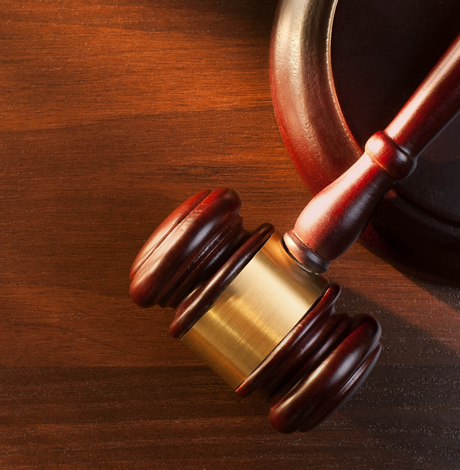National
Court finds anti-gay workforce bias legal, still rules for gay plaintiff
Judges cite sex stereotyping prohibition in decision


A federal appeals court ruled for a gay plaintiff despite finding anti-gay workforce bias is lawful.
A federal appeals court ruled Monday anti-gay bias in the workplace is legal under current federal civil rights law barring discrimination based on sex, but nonetheless handed a victory to a gay plaintiff on the basis that the discrimination she faced amounted to illegal sex-stereotyping.
In a 15-page opinion, a three-judge panel on the U.S. 2nd Circuit Court of Appeals unanimously found precedent bars the court from concluding the global DDB Worldwide Communications Group illegally discriminated against Matthew Christiansen for being gay under the Title VII of the Civil Rights of Act.
The per curiam opinion found a district court handling the Christiansen v. Omnicom Group erred in its conclusion sexual-orientation discrimination constitutes sex discrimination under federal civil rights law, citing the 2000 decision in Simonton v. Runyon and the 2005 decision in Dawson v. Bumble & Bumble.
“Because we are ‘bound by the decisions of prior panels until such time as they are overruled either by an en banc panel of our Court or by the Supreme Court…it [is] ordinarily…neither appropriate nor possible for [a panel] to reverse an existing Circuit precedent,'” the decision says. “We thus lack the power to reconsider Simonton and Dawson.”
However, the court concluded Christiansen, who’s openly gay and HIV positive, made a compelling case he faced discrimination based on sex-stereotyping, which the U.S. Supreme Court determined is unlawful in the 1989 decision of Price Waterhouse v. Coopers.
“Christiansen’s complaint identifies multiple instances of gender stereotyping discrimination,” the decision says. “His complaint alleges that his supervisor described him as ‘effeminate’ to others in the office…and depicted him in tights and a low‐cut shirt ‘prancing around.’ The complaint further alleges that the ‘Muscle Beach Party’ party poster, depicting Christiansen’s head attached to a bikini‐clad female body lying on the ground with her legs in the air, was seen by at least one coworker as portraying Christiansen ‘as a submissive sissy.'”
As a result, the court reverses the district court decision rejecting Christiansen’s allegations of sex-stereotyping in the workforce, remanding the decision for reconsideration.
The three-judge panel consisted of U.S. Chief Judge Robert Katzmann, a Clinton appointee; U.S. Circuit Judge Debra Ann Livingston, a George W. Bush appointee; and U.S. District Judge Margo Brodie, an Obama appointee sitting on the court by designation.
In a concurring opinion, Katzmann and Brodie examine the evolution of the understanding of sexual orientation in the legal landscape. Although the judges say precedent prevents them from determining sexual-orientation discrimination is sex discrimination, they conclude the time has come for reconsideration by the full court under “en banc” review.
“I respectfully think that in the context of an appropriate case our Court should consider reexamining the holding that sexual orientation discrimination claims are not cognizable under Title VII,” Katzmann writes. “Other federal courts are also grappling with this question, and it well may be that the Supreme Court will ultimately address it.”
A number of cases are percolating federal appeals court urging the judiciary to determine sexual-orientation discrimination is sex discrimination under current law. In a new trend, district courts and the U.S. Equal Employment Opportunity Commission have found Title VII bars anti-gay bias in the workforce, although no federal appeals court has reached that conclusion.
Had the 2nd Circuit ruled that sexual-orientation discrimination is unlawful under Title VII, it would have been the first federal appeals court to determine existing civil rights law extends to gay, lesbian and bisexual people in the workforce.
Shannon Minter, legal director for the National Center for Lesbian Rights, said the ruling had promise even though judges concluded the sexual-orientation discrimination isn’t unlawful under Title VII.
“I am actually encouraged by the court’s recognition that there is no principled reason to exclude sexual orientation discrimination from Title VII, and by their support for ‘en banc’ review,” Minter said. “Courts are finally taking these claims seriously, and I expect that we will see more and more positive decisions, hopefully including a positive ‘en banc’ decision from the 11th Circuit.”
State Department
State Department releases annual human rights report
Antony Blinken reiterates criticism of Uganda’s Anti-Homosexuality Act

Secretary of State Antony Blinken on Monday once again reiterated his criticism of Uganda’s Anti-Homosexuality Act upon release of the State Department’s annual human rights report.
“This year’s report also captures human rights abuses against members of vulnerable communities,” he told reporters. “In Afghanistan, the Taliban have limited work opportunities for women, shuttered institutions found educating girls, and increasing floggings for women and men accused of, quote, ‘immoral behavior,’ end quote. Uganda passed a draconian and discriminatory Anti-Homosexuality Act, threatening LGBTQI+ individuals with life imprisonment, even death, simply for being with the person they loved.”
Ugandan President Yoweri Museveni last May signed the law, which contains a death penalty provision for “aggravated homosexuality.”
The U.S. subsequently imposed visa restrictions on Ugandan officials and removed the country from a program that allows sub-Saharan African countries to trade duty-free with the U.S. The World Bank Group also announced the suspension of new loans to Uganda.
Uganda’s Constitutional Court earlier this month refused to “nullify the Anti-Homosexuality Act in its totality.” More than a dozen Ugandan LGBTQ activists have appealed the ruling.
Clare Byarugaba of Chapter Four Uganda, a Ugandan LGBTQ rights group, on Monday met with National Security Council Chief-of-Staff Curtis Ried. Jay Gilliam, the senior LGBTQI+ coordinator for the U.S. Agency for International Development, in February traveled to Uganda and met with LGBTQ activists who discussed the Anti-Homosexuality Act’s impact.
“LGBTQI+ activists reported police arrested numerous individuals on the basis of their sexual orientation or gender identity and subjected many to forced anal exams, a medically discredited practice with no evidentiary value that was considered a form of cruel, inhuman, and degrading treatment and could amount to torture,” reads the human rights report.
The report, among other things, also notes Ugandan human rights activists “reported numerous instances of state and non-state actor violence and harassment against LGBTQI+ persons and noted authorities did not adequately investigate the cases.”
Report highlights anti-LGBTQ crackdowns in Ghana, Hungary, Russia
Ghanaian lawmakers on Feb. 28 approved the Promotion of Proper Human Sexual Rights and Ghanaian Family Values Bill. The country’s president, Nana Akufo-Addo, has said he will not sign the measure until the Ghanaian Supreme Court rules on whether it is constitutional or not.
The human rights report notes “laws criminalizing consensual same-sex sexual conduct between adults” and “crimes involving violence or threats of violence targeting lesbian, gay, bisexual, transgender, queer or intersex persons” are among the “significant human rights issues” in Ghana.
The report documents Hungarian Prime Minister Viktor Orbán and members of his right-wing Fidesz party’s continued rhetoric against “gender ideology.” It also notes Russia’s ongoing crackdown against LGBTQ people that includes reports of “state actors committed violence against LGBTQI+ individuals based on their sexual orientation or gender identity, particularly in Chechnya.”
The report specifically notes Russian President Vladimir Putin on July 24 signed a law that bans “legal gender recognition, medical interventions aimed at changing the sex of a person, and gender-affirming care.” It also points out Papua New Guinea is among the countries in which consensual same-sex sexual relations remain criminalized.

The Cook Islands and Mauritius in decriminalized homosexuality in 2023.
The report notes the Namibia Supreme Court last May ruled the country must recognize same-sex marriages legally performed outside the country. The report also highlights the Indian Supreme Court’s ruling against marriage equality that it issued last October. (It later announced it would consider an appeal of the decision.)
Congress requires the State Department to release a human rights report each year.
The Biden-Harris administration in 2021 released a memorandum that committed the U.S. to promoting LGBTQ+ and intersex rights abroad.
The full report can be read here.
National
Same-sex couples vulnerable to adverse effects of climate change
Williams Institute report based on Census, federal agencies

A new report by the Williams Institute at the UCLA School of Law finds that same-sex couples are at greater risk of experiencing the adverse effects of climate change compared to different-sex couples.
LGBTQ people in same-sex couple households disproportionately live in coastal areas and cities and areas with poorer infrastructure and less access to resources, making them more vulnerable to climate hazards.
Using U.S. Census data and climate risk assessment data from NASA and the Federal Emergency Management Agency, researchers conducted a geographic analysis to assess the climate risk impacting same-sex couples. NASA’s risk assessment focuses on changes to meteorological patterns, infrastructure and built environment, and the presence of at-risk populations. FEMA’s assessment focuses on changes in the occurrence of severe weather events, accounting for at-risk populations, the availability of services, and access to resources.
Results show counties with a higher proportion of same-sex couples are, on average, at increased risk from environmental, infrastructure, and social vulnerabilities due to climate change.
“Given the disparate impact of climate change on LGBTQ populations, climate change policies, including disaster preparedness, response, and recovery plans, must address the specific needs and vulnerabilities facing LGBTQ people,” said study co-author Ari Shaw, senior fellow and director of international programs at the Williams Institute. “Policies should focus on mitigating discriminatory housing and urban development practices, making shelters safe spaces for LGBT people, and ensuring that relief aid reaches displaced LGBTQ individuals and families.”
“Factors underlying the geographic vulnerability are crucial to understanding why same-sex couples are threatened by climate change and whether the findings in our study apply to the broader LGBTQ population,” said study co-author Lindsay Mahowald, research data analyst at the Williams Institute. “More research is needed to examine how disparities in housing, employment, and health care among LGBT people compound the geographic vulnerabilities to climate change.”
Read the report
Federal Government
Lambda Legal praises Biden-Harris administration’s finalized Title IX regulations
New rules to take effect Aug. 1

The Biden-Harris administration’s revised Title IX policy “protects LGBTQ+ students from discrimination and other abuse,” Lambda Legal said in a statement praising the U.S. Department of Education’s issuance of the final rule on Friday.
Slated to take effect on Aug. 1, the new regulations constitute an expansion of the 1972 Title IX civil rights law, which prohibits sex-based discrimination in education programs that receive federal funding.
Pursuant to the U.S. Supreme Court’s ruling in the landmark 2020 Bostock v. Clayton County case, the department’s revised policy clarifies that discrimination on the basis of sexual orientation and gender identity constitutes sex-based discrimination as defined under the law.
“These regulations make it crystal clear that everyone can access schools that are safe, welcoming and that respect their rights,” Education Secretary Miguel Cardona said during a call with reporters on Thursday.
While the new rule does not provide guidance on whether schools must allow transgender students to play on sports teams corresponding with their gender identity to comply with Title IX, the question is addressed in a separate rule proposed by the agency in April.
The administration’s new policy also reverses some Trump-era Title IX rules governing how schools must respond to reports of sexual harassment and sexual assault, which were widely seen as imbalanced in favor of the accused.
Jennifer Klein, the director of the White House Gender Policy Council, said during Thursday’s call that the department sought to strike a balance with respect to these issues, “reaffirming our longstanding commitment to fundamental fairness.”
“We applaud the Biden administration’s action to rescind the legally unsound, cruel, and dangerous sexual harassment and assault rule of the previous administration,” Lambda Legal Nonbinary and Transgender Rights Project Director Sasha Buchert said in the group’s statement on Friday.
“Today’s rule instead appropriately underscores that Title IX’s civil rights protections clearly cover LGBTQ+ students, as well as survivors and pregnant and parenting students across race and gender identity,” she said. “Schools must be places where students can learn and thrive free of harassment, discrimination, and other abuse.”
-

 South America4 days ago
South America4 days agoDaniel Zamudio murderer’s parole request denied
-

 Maryland5 days ago
Maryland5 days agoMontgomery County police chief discusses arrest of trans student charged with planned school shooting
-

 State Department23 hours ago
State Department23 hours agoState Department releases annual human rights report
-

 Theater4 days ago
Theater4 days ago‘Amm(i)gone’ explores family, queerness, and faith











